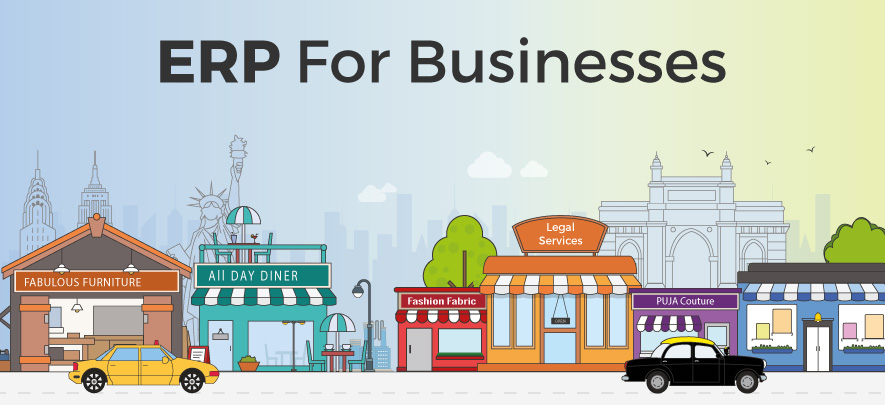Implementing ERP is no longer an ‘if’ but ‘when’

Digital & Technology
345 week ago — 7 min read
According to Wikipedia, “Enterprise Resource Planning (or ERP) is the integrated management of core business processes, often in real-time and mediated by software and technology." In short, it is designed to be an efficient recording system for operating and managing a business that involves the integration of key business processes such as planning, purchasing, inventory, sales, marketing, finance and human resources etc.
Sounds expensive, time consuming and complicated, right?
Also, there are a number of reasons why most hesitate to integrate an ERP implementation into their business processes. Some of these reasons include the internal effort required to implement an ERP; the confidence of being able to function effectively without an ERP; the expenses involved for the purchase of software and services and the complications that come with any technological implementation and resistance to change or adaptation of new technology often experienced by the workforce.
To ERP or not to ERP – that’s a constant struggle.
Some businesses, especially those relatively small and growing, feel that they hardly have the time for an ERP implementation and that they can continue to function efficiently without it while assessing it’s cost/benefit trade-offs. And of course when you have been working with spreadsheets, accounting applications, multiple disparate applications or legacy applications that aren’t usually considered an ERP, home grown and/or desktop applications, your business process management seem to be working just fine.
But, is it efficient, enough… is there ‘absolutely’ no room for further improvement? Well, think again!
There are a number of scalable ERP solutions that businesses can implement to fuel growth. Whether your organisation is small or large, integrating ERP into the day-to-day operational processes could prove to be impactful, especially if you need to:
- Reduce administrative and operating costs
- Improve overall customer experience
- Improve customer response time
- Manage growth expectations
- Streamline and accelerate processes thereby leading to improved efficiency and productivity
- Standardise business processes
- Provide enhanced visibility across business processes and functions
- Optimise the use of current capacity
- Modernise technology infrastructure and applications
So, integrating ERP into your business processes is no longer an ‘if’ but a strategy of ‘when’.
Again, there may never be a perfect time for implementing ERP software. However, to increase the likelihood of a successful ERP implementation, there are certain times better than waiting forever.
1. All businesses go through a lull period from time to time. And that’s the ideal time to take a step back to integrate the ERP software into your business processes. It definitely helps to be able to dedicate more time and attention, with fewer distractions, thereby leading to a higher success rate of implementation.
2. To err is human. And trying to absorb all the knowledge and information about ERP implementation may seem a dreadful task – especially, when your employees are swamped with deliveries and deadline pressure. Thus, it is advisable to impart ERP training through incremental instalments. This approach not only encourages employees to ask more questions and clarify doubts, but also helps to reduce performance errors to a great extent as they’re able to internalize the processes more proactively through these training sessions.
3. Organisations with more than one subsidiary under its wings, should, look at integrating the ERP software to its smaller businesses, first. Transitioning onto the new software for a smaller business could iron-out implementation issues, lead to increased efficiency and help to navigate around mistakes. Think of it like a case study – a sample research that could help to prepare you for handling bigger hurdles. A pilot programme which can be adapted and enhanced for firm-wide implementation of ERP.
4. Look before you leap. Any business going through a major organisational upheaval should wait before implementing ERP. User roles need to be clearly defined and fully understood before embarking on the journey of ERP implementation, training and usage.
5. Look for signs. There’s almost always a sign indicating the opportune moment for making significant changes, professionally or otherwise. Implementation of an effective ERP system is no different. For example, if a department is struggling to complete its tasks on time or overloaded with BAU (business-as usual tasks), it’s definitely time to consider alternatives for an increase in efficiency. It is better to have a unified software that integrates solutions and data into one system with a common interface than having to deal with multiple disintegrated applications that create inter-departmental communication hurdles at every step.
6. Make a list. Always. One of the vital steps of knowing ‘when’ to implement an ERP software into your business is to have a checklist that answers pertinent questions. For example, how much revenue is a certain product segment bringing in or what is the return on investment that you have received? Are there areas where you are losing control over your processes? Is it getting harder to manage inventory, satisfy customers, or ensure cost efficiency? Are your employees forced to concentrate in segregating through duplicate data entries into separate systems, thereby failing to adhere to delivery timelines? Is reporting taking longer with magnified chances of errors? It’s a red flag if you have been able to relate to any of these questions. It’s time to restructure your business process so as to be able to accommodate the changing priorities of your business. It’s time to integrate ERP software into the system.
Simply put, as the leader of an organisation if you have been able to assess the risks, recognise the emergent need for process improvement and agree to re-engineer processes before implementation, ERP software is an investment, worth your money.
To explore business opportunities, link with me by clicking on the 'Invite' button on my eBiz Card.
Disclaimer: The views and opinions expressed in this article are those of the author and do not necessarily reflect the views, official policy or position of GlobalLinker.
Network with SMEs mentioned in this article
View Vineet 's profile
Most read this week













Comments (4)
Share this content
Please login or Register to join the discussion